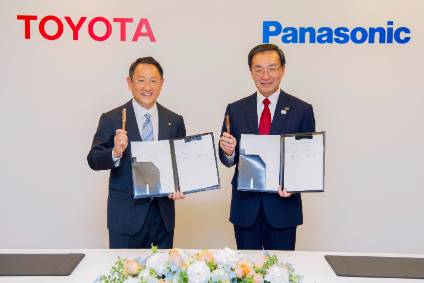
Toyota Motor and Panasonic announced on Monday (3 February) they would establish Prime Planet Energy & Solutions, a joint venture (JV) specialising in automotive prismatic batteries.
This came just over a year after the two companies announced – on 22 January, 2019 they had concluded a business integration contract and a joint-venture contract toward the establishment of a new company.

Discover B2B Marketing That Performs
Combine business intelligence and editorial excellence to reach engaged professionals across 36 leading media platforms.
The pair also outlined the joint venture.
"Batteries – as solutions for providing energy for automobiles and various other forms of mobility, and as solutions for various kinds of environmental issues – are expected to fulfill a central role in society going forward – a role that supports people's lives," the two firms said in a joint statement.
The JV will develop "highly competitive, cost-effective batteries that are safe and feature excellent quality and performance (in terms of capacity, output, durability)," the two companies said, and would be sold to Toyota and any other automaker or company which wanted to buy them.
The JV, owned 51% by the automaker and 49% by the supplier, will start operations on 1 April, 2020, headed by representative director and president Hiroaki Koda from Toyota.
It will, make high capacity, high output automotive prismatic lithium ion batteries, solid state batteries and develop and out into production other new battery technology.
The new JV will employ about 5,100 people including 2,400 at a subsidiary in China.
A Reuters report noted the JV reflects the aim of the two Japanese companies to become bigger global players in the automotive battery industry, which is vital for the development of affordable EVs, as stricter environmental regulations worldwide accelerate a shift toward environment friendlier cars.
Panasonic has been the exclusive supplier of cylindrical batteries for Tesla but has been looking to expand its list of customers by stepping up development of prismatic batteries more widely used by the industry. Tesla last month announced it would also source batteries from South Korea's LG Chem and China's CATL.
Toyota, which pioneered the petrol electric hybrid Prius in 1997, aims to get half of its sales from electrified vehicles by 2025, and is both developing its own batteries and tapping new suppliers to avoid a shortfall, the news agency also noted, adding the two Japanese firms have been cooperating on battery research since at least 1996 when they set up a joint venture to make hybrid car batteries, called Primearth EV Energy.




